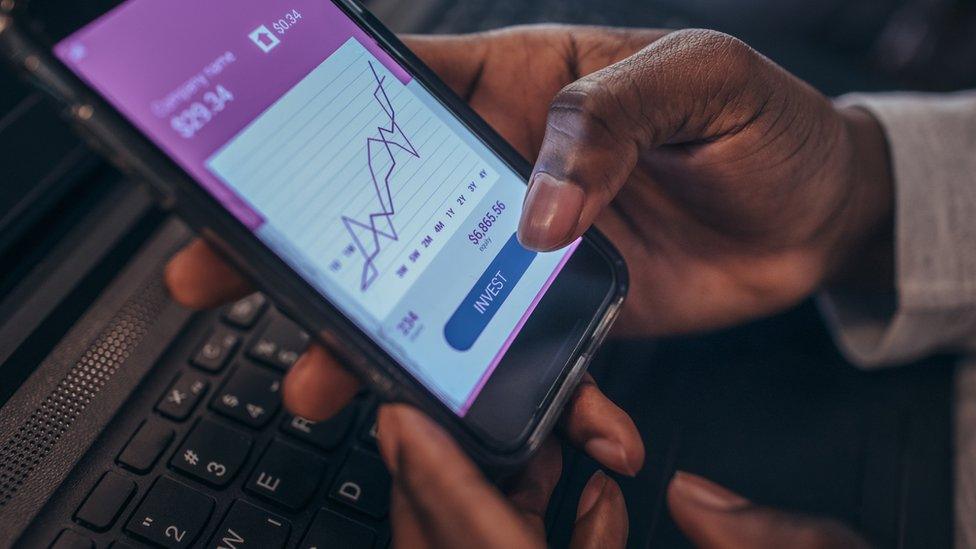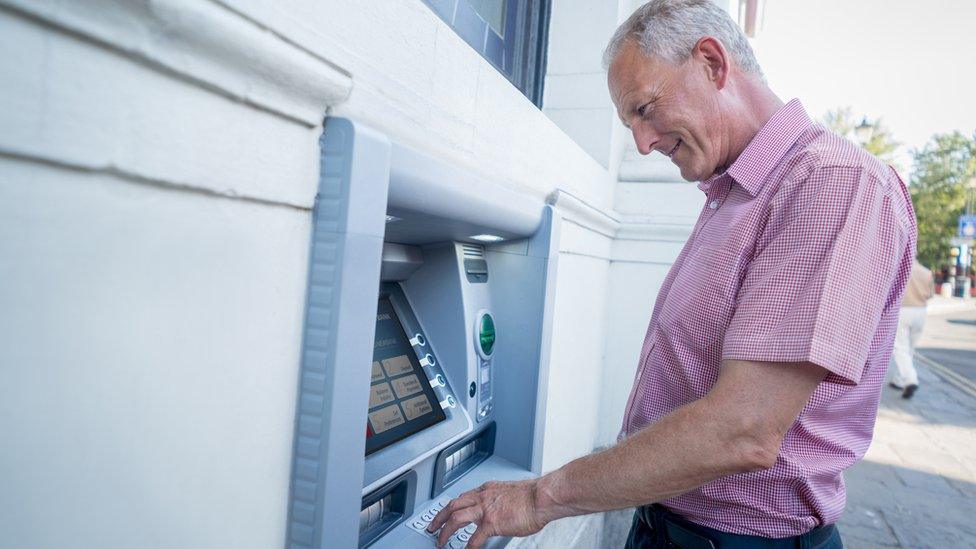Coronavirus: Credit where it’s due
- Published

It has fared relatively well, but the banking and business services sector is still showing worrying signs of stress.
Investment and employment have all turned negative, and although some are thriving, in general, business confidence is poor.
Offices have been emptied, and an entire industry is now home-based. What will have changed when it returns to the morning commute into city centres - if it returns?
Compared with those who face financial and employment catastrophe as a result of Covid-19 - tourism, hospitality, aviation - the finance and business services sector has been quietly taking care of business and without much fuss.
Across the UK, it has shifted hundreds of thousands of people from offices to home working. While others are allowed to return to factories and construction sites, it could be a long time until non-essential offices reopen.
True, customers may take longer to have their calls answered. Many staff were shifted onto handling applications for the government-backed Coronavirus Business Interruption Loan Scheme.
It has proved to involve a slow process of judging creditworthiness of bank customers for the 20% of loans not covered by the government.

Most people in the banking sector have been working from home
Of 104,000 applications, only half had been approved by the end of June.
Along came the Bounce Back Loan, 100% guaranteed by the Treasury, and the banks have seen them flying… if not out the door, then down the fibre-optic cable.
Nearly £30bn has been loaned to 967,000 firms.
To achieve that shift of location and business focus, finance industry insiders suggest that it adapted to about five years' worth of change within a few weeks.
Contrast that with the last recession, when the finance sector was the problem: if there's one aspect of this downturn that's turned out ok, so far, it's in the availability of credit and the functioning of the financial system.
Investment down
This week, though, we got some deeper insight into what's been going on. The Scottish Chambers of Commerce quarterly survey of members showed how badly things have looked for tourism and retail.
Of the sectors it covers, finance and business services fared least badly. But by the standards of any other time, it looks worrying.
This is a very large sector when you put finance beside business services, such as accountancy and office supply. In a total sample size of 500 companies across Scotland, this part of it is meant to be representative, as identified by the Fraser of Allander Institute, but there is a margin for error.
That said, asked about business optimism, 18% were upbeat, 63% were not. With a net balance between these two figures of -45%, that's a long way from the +28% this time last year. It's generally positive in its outlook.
Sales revenue was down for 70% of the firms responding. Sales to Scottish customers were down by the same amount, 50% of firms said UK sales were down, and 34% said that of exports.

Many financial and accountancy firms have been upbeat about their figures
That should not be a surprise. The companies to which they sell their services are in parts of the economy that stopped, or slowed considerably.
You might hope, however, that this sector might keep investing through the downturn, to build for the upturn, and particularly when credit is so cheap.
Not so. Half of firms said total investment was down, and nearly a third said it stayed the same: 48% said capital investment was down and 44% said that of training.
Demand for credit
While other sectors are shedding staff by the thousands, the employment trends over the past quarter for finance and business services have also, on balance, been negative. Some 7% were boosting recruitment, and 23% lowering it.
For the third quarter - July to September - there are less negative prospects. On balance, more companies expect to grow investment than expect to see it fall.
On sales revenue, 21% expect to see a rise, and 26% expect it to fall. On employment, it's a more negative outlook still: 10% of firms say it'll be up, but 22% say it will fall.

More and more cash machines are disappearing
None of these figures tell you by how much figures may shift up or down. They are a rawer, binary barometer of change - up or down. But even for finance and business services, the indications are for a stormy time ahead.
There is still a strong demand for what the finance sector has to offer. The broader Chamber of Commerce survey, after 30 years of collecting data, found that credit has never been so much in demand, even though confidence has never been lower.
If you're in the insolvency end of accountancy, it's getting hectic. One marketing firm boss told me this week that he's never been busier, as locked-down firms turn to him for help on re-engaging with customers.
Cashless
Coming out the other side, one question for all such firms is how much they need to adapt to a permanent shift in home-working, which knocks on to the office rental market.
Yet the feedback I'm hearing is that while staff want the flexibility to work at home, they look forward to an end to it as a requirement.
When investment picks up, the recovery will also coincide with some big shifts to automation in back office roles. With that in sight, job losses in HSBC, for instance, are eye-watering.
The other battle, to be rejoined, is over branch closures. The decline of conventional retail is being accelerated, and the hospitality industry was forced to stop. So banks will want to adapt further to the continued decline in footfall.
And they are already bracing for the inevitable row about the falling number of cash machines. The use of them has plummeted. Card payments have picked up, and are increasingly required in shops.
A trial is being run across several towns where the decline of a bank presence has become a problem - in Scotland, that includes Cambuslang and Denny, trying to innovate with ways to handle the shift to an all-but-cashless economy.
